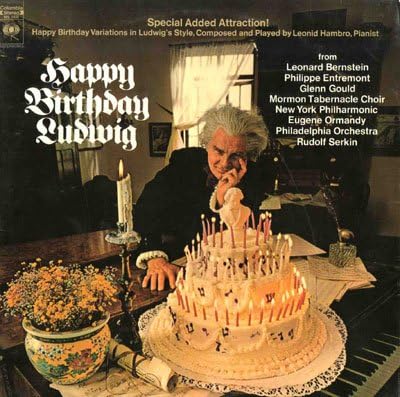
Today we celebrate the 250th anniversary of the birth of Ludwig van Beethoven. (And so I'm listening to our local classical station, which is going all-Beethoven for the day later this morning.) He's often considered the greatest composer in the Western classical tradition - J.S. Bach and W.A. Mozart are the only other likely candidates - and he's certainly one of my favorites. And he was also my gateway into the serious classical repertoire, which has been the heart and bulk of my music listening since, oh, around Beethoven's 200th birthday (which I celebrated by picking up a CBS promotional LP called Happy Birthday Ludwig with a photo on the cover of an impersonator in a Beethoven workroom gazing happily at a large birthday cake).
I'd previously been listening to light classics - Rossini overtures, Strauss waltzes, 19C tone poems - which satisfied me more than any "popular" music I'd heard, but at first I shied away from symphonies and other heavy classics, which intimidated me. But eventually I worked up the gumption to face my parents' box set of Beethoven symphonies (René Leibowitz conducting the Royal Philharmonic). At this time I knew three things about the Beethoven symphonies: 1. There were nine of them. 2. They were supposed to be the greatest orchestral music in the repertoire. 3. Number five went "da-da-da-dum." That's it. I had never actually heard any of them. I was twelve.
I took out the Fifth and put it on the turntable, curious to hear what else it did. It couldn't just go "da-da-da-dum" for half an hour. Actually, in a sense it could. I had never encountered symphonic architecture before, and the experience of hearing what a towering structure Beethoven could construct out of that simple four-note phrase in the first movement, with echoes in the rest, overwhelmed me. This was the kind of music I was born to hear.
I was immediately converted. I quickly listened to all the Beethoven symphonies and got to know them all, and went on to the rest of the concert ensemble repertoire, at first other composers' orchestral works and later chamber music including Beethoven's.
So what's my favorite Beethoven? Don't ask me to choose among his symphonies. I guess that, picking up a set of recordings, I'm most likely to listen to the Seventh - one of the most high-energy symphonies of all time - and the Eighth - a fierce little monster - and, believe it or not, the First: it's Haydnesque with all the brusque qualities, that Haydn had edited out of his increasingly galant music by that time, put back in.
I'm not generally much of a concerto listener, but I like Beethoven's. (Except for the Triple Concerto and the Choral Fantasy.) Of all of them, the Emperor Concerto, for piano and orchestra, is the greatest. The first movement is so charming (I especially like the "music box" second theme) and the second movement so profoundly beautiful. (Remember that Beethoven wrote this while Napoleon was besieging Vienna, with the composer spending most of his time hiding in the basement with pillows over his ears to protect the remains of his hearing from the sound of cannon. Puts the lie to all latter-day claims that ugly times require ugly music, doesn't it?) And the way the slow movement melts into the finale is one of my favorite transition moments in all music.
Beethoven's chamber ensemble music includes a lot of things - piano-and-strings trios were a specialty of his - but it's totally dominated by his string quartets. I finally learned my way around these, to the extent of being comfortable with them, while reviewing performances of them for SFCV, and wasn't that a task, especially because the late quartets are the most challenging concert works in the pre-20C repertoire, a few works by Bach being their only competition. I'd vote for Op. 130 and Op. 132 as the greatest, especially for their moments of charm and beauty among the vast tracts of serious and somber esoterica. Of the earlier quartets, I'd choose as favorites Op. 18 No. 4 and Op. 74.
Beethoven is one of the few composers whose solo piano music I really look forward to hearing. (Schumann and Prokofiev are the others.) I confess I don't really know my way around his 32 sonatas, except for the really famous ones and a couple early-period favorites, but I recently listened my way through the entirety of András Schiff's lecture-recitals on the whole set, which with the scores in front of me was highly illuminating, especially for the early and middle period works.
There's a few other odd corners of Beethoven's instrumental music worth exploring. One work I came across at a Beethoven miscellanea concert was this early sonatina for mandolin and keyboard, to which my reaction was, "Beethoven invented bluegrass!"
B. says Beethoven couldn't write adequately for voices, perhaps because he went deaf, but even before that. I do find the Ode to Joy the least compelling part of the otherwise epically enthralling Ninth Symphony, and why anyone ever performs the extremely early Cantata on the Death of the Emperor Joseph II beats me. Maybe they like the title. Beethoven wrote only one opera, which he spent years tinkering with (including changing the title), but it's not particularly highly ranked by lovers of opera. But there's one other obscure corner of Beethoven vocal music worth exploring. He spent years earning occasional spending money by arranging piano-and-strings accompaniments for English-language folk songs, for a Scottish publisher who paid well. (Beethoven didn't read English, so he had to have the lyrics translated to have any idea of what they were saying.) Here's one you should know.
And on that, I'll wish you a music-filled Beethoven's birthday, a cheerful Hanukkah, a merry Christmas, and a happy New Year.

No comments:
Post a Comment